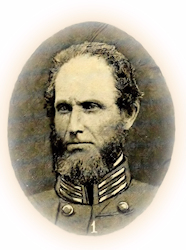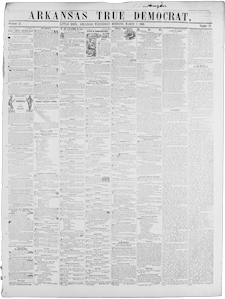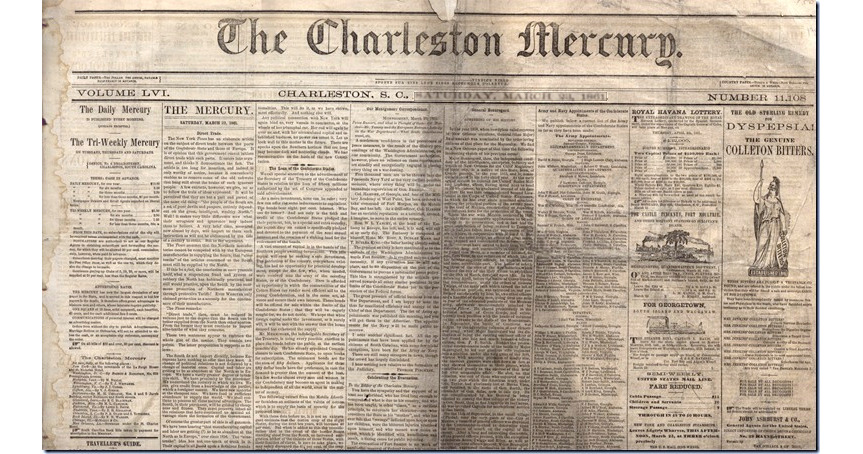April 8, 1863, The Charleston Mercury
HEADQUARTERS, DEPARTMENT OF SOUTH CAROLINA, GEORGIA AND FLORIDA,
GENERAL ORDERS No. 58.
CHARLESTON, S.C. April 5, 1863.
I. FIELD AND COMPANY OFFICERS ARE SPECIALLY enjoined to instruct their men under all circumstances to fire with deliberation at the feet of the enemy; they will thus avoid over-shooting, and, besides, wounded men give more trouble to our adversary than his dead, as they have to be taken from the field.
II. Officers in command must be cool and collected in action, hold their men in hand, and caution them against useless, aimless firing. The men must be instructed and required each one to single out his mark. It was the deliberate sharp-shooting of our forefathers in the Revolution of 1776, and at New Orleans in 1815, which made them so formidable against the odds with which they were engaged.
III. In the beginning of a battle, except by troops deployed as skirmishers, the fire by file will be avoided: It excites the men, and renders their subsequent control difficult; fire by wing or company should be resorted to instead. During the battle, the officers and non-commissioned officers must keep the men in the ranks, enforce obedience, and encourage and stimulate them if necessary.
IV. Soldiers must not be permitted to quit the ranks to strip or rob the dead, nor even to assist in removing our own dead, unless by special permission, which shall only be given when the action has been decided. The surest way to protect our wounded is to drive the enemy from the field; the most pressing, highest duty is to win the victory.
V. Before the battle, the Quartermaster of the Division will make all the necessary arrangements for the immediate transportation of the wounded from the field. After consulting with the Medical Officers, he will establish the Ambulance Depot in the rear, and give his Assistants the necessary instructions for the efficient service of the Ambulance Wagons and other means of transportation.
VI. The Ambulance Depot, to which the wounded are to be conveyed or directed for immediate treatment, should be established at the most convenient building nearest the field of battle. A red flag marks the place and way to it.
VII. Before and immediately after battle the roll of each Company will be called, and absentees must strictly account for their absence from the ranks. To quit their standard on the battle field, under fire, under the pretence of removing or aiding the wounded, will not be permitted. Any one persisting in it will be shot on the spot; and whoever shall be found to have quit the field, or his Regiment or Company, without authority, will be regarded and proclaimed as a coward and dealt with accordingly.
VIII. The active ambulances will follow the troops to succor the wounded, and to remove them to the depots. Before the engagement INFIRMARY Detachments will also be detailed and organized, of three men (the least effective under arms) from each Company, whose duties will be hereinafter prescribed. These men must not loiter about the Depots, but will return promptly to the field as soon as possible.
IX. The Infirmary Detachments will be under the immediate orders of the Medical Officers on the field. This Corps is to go upon the field unarmed, except the non-commissioned officers, who are to protect the Corps against stragglers and marauders. The members will be provided with one litter to every two men, and each with a badge by which he can be easily distinguished from the rest of the command, also with leather shoulder straps, a canteen of water, a tin cup, a haversack, containing a half pound of line, twenty-four bandages, two long and two short splints of wood, sponges and tourniquets, and a pint bottle of alcoholic stimulant.
X. It shall be the duty of this corps, under the immediate direction of the Assistant-Surgeon of the regiment, accompanied by the ambulances or wagons, to follow up promptly the action, administering to the immediate wants of the wounded, by giving stimulus, checking hemorrhage and the temporary splinting of fractures.
XI. Those who are too much disabled to walk, will be removed to some ambulance depot, previously agreed upon, where they will be left in charge of the Surgeon of the regiment. The removal of the wounded from the field will devolve upon the Infirmary Corps, and all men straggling from the ranks under pretext of aiding this corps will be summarily dealt with, to which end, the medical officers in charge and the non-commissioned officers are specially required to report to the regimental commanders of the stragglers, their names, and the company to which they may belong.
XII. The Assistant Surgeon in charge of the Infirmary Corps should provide himself with a pocket case, ligatures, needles, pins, chloroform, napkins, brandy or whisky, tourniquets, bandages, lint and splints. To obviate the shock of the nervous system, to suppress hemorrhage, to put fractures in some temporary apparatus, so as to facilitate the removal of the wounded, should be his first care. This last is best accomplished by placing under the fractured limb a piece of old linen or cotton, of the form of a pocket handkerchief; on the opposite and outer edges of this are placed the splints, which are rolled up in it, toward the lint, on each side; until the fracture is snugly supported in the intervening space; the whole to be secured by two or three bands of tape or of bandage.
XIII. The Regimental Surgeon should, before an action, satisfy himself by personal inspection, that all the means and appliances for carrying the wounded are at hand; give instructions to the Infirmary Corps as to the application of a tourniquet to restrain dangerous hemorrhage; establish depots for the wounded, under the supervision of the Medical Director; and render to the men of his regiment all necessary surgical aid; performing there all operations that are required; and he will be held responsible that he has at his disposition all the means, supplies and appliances, for the proper performance of the service enjoined, or has taken all proper measures to secure them. He will instruct all detailed to assist him, not to allow ambulances to be monopolised by wounded officers, to the exclusion of others. He will forbid any of the Infirmary Corps to hold officers’ horses on the field, or to do anything but what strictly appertains to their duty. The Surgeon should not devote himself exclusively to a wounded officer, nor leave his post to accompany his to the rear.
XIV. Wounds will be dressed and operations performed as far as practicable on the field, and patients made as comfortable as circumstances will admit for transportation to hospitals in the interior.
XV. Surgeons will supply themselves with Hospital Flags, and will have them attached to the Ambulances and placed conspicuously over the Field Infirmaries and Hospitals.
XVI. As soon as possible after an action, Surgeons will transmit to the Medical Director a return of casualties according to the following form: RETURN OF KILLED AND WOUNDED in the ———-Regiment, in the action of———–.
XVII. The material for the Badges and for the Ambulance Flags prescribed in VI. paragraph of this Order will be provided by the Quartermaster’s Department.
By command of General BEAUREGARD.
(Signed) THOMAS JORDAN,
Official: Chief of Staff.
JNO. M. OTEY, A.A.G. April 6
HEADQUARTERS,
DEPARTMENT OF SOUTH CAROLINA, GEORGIA AND FLA.,
CHARLESTON, April 5, 1863
(SPECIAL ORDERS No. 77)
I. IN CASE OF A BOMBARDMENT OF THE CITY OF Charleston, should any Hospital become untenable, Medical Officers in charge, and those unattached to Regiments, unless otherwise specially ordered, will repair forthwith to the temporary Hospital established four miles from the city, next adjoining the building known as the ‘Four Mile House,’ where they will convey all hospital property that can be removed, and with them attendants and nurses will report to the Surgeon in charge for duty.
II. Wounds will be dressed and operations will be performed, as far as possible, on the field, and patients will be made as comfortable as circumstances will admit for transportation to Hospitals in the interior.
III. Medical Inspectors are charged with the general supervision of the removal of the wounded by railroad to the Hospitals at Summerville and Columbia.
By command of General BEAUREGARD.
April 6 JNO. M. OTEY. A.A., Gen.








